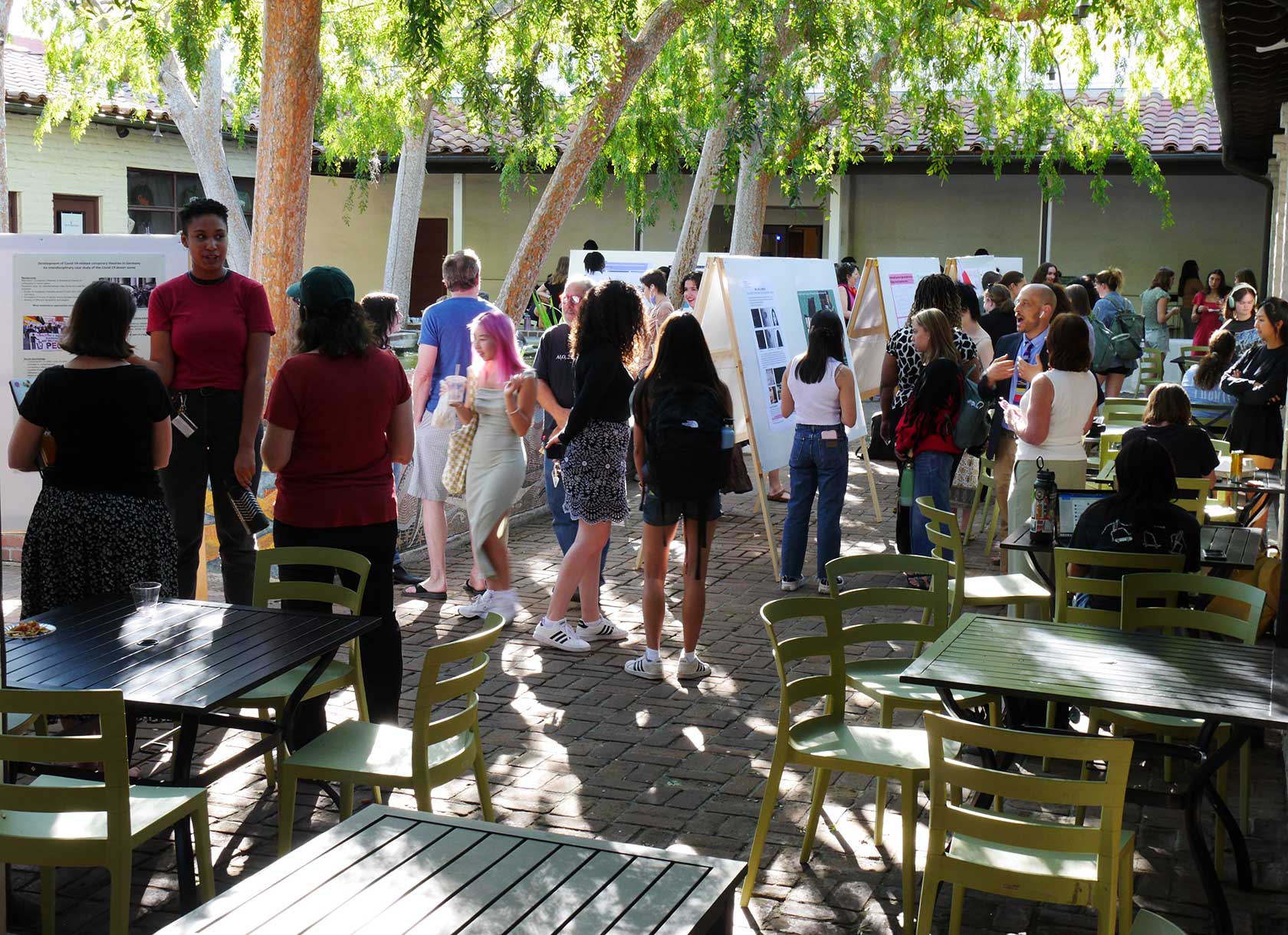By Mirabella Miller ’24

On September 27, Scripps students had the opportunity to present the results of their summer research to the wider Scripps community, including peers, professors, and other community members, at the annual Summer Research Tea. The variety of research topics on display, spanning a vast breadth of disciplines and mediums, spoke to the widely varied interests of Scripps students. From the role of the stress hormone cortisol to creative writing about young adulthood, each researcher engaged creatively and meaningfully with subjects that piqued their academic interest.
“I thought the Summer Research Tea was a big success, thanks, in large part, to Raina Coutin, who worked extensively with students and staff to organize the event,” says Warren Liu, associate dean of faculty and professor of English. “The turnout was fantastic, with students, staff, and faculty all mingling in Seal Court, and it was wonderful to see the student presenters sharing their work with the Scripps community.”
Each summer, Scripps awards various grants to support summer research projects, including the Johnson Summer Research Grant, the Scripps Undergraduate Fellowship in Environmental Analysis (EA), the Racial Justice and Equity Fund, the Virginia J. Esterly Award, the Mellon Interdisciplinary Humanities Initiative (MIHI), the Arthur Vining Davis Student Summer Library Internship, and the Ellen Browning Scripps Internship. Through these funding opportunities, students can contribute to faculty-directed research projects or pursue independently designed projects with the mentorship and guidance of a faculty member.
The Environmental Analysis fellowship enabled Sophia Shepard ’24 to explore the intersections between militarism and climate change as background research for her upcoming senior thesis in environmental analysis and writing and rhetoric; Simar Malhotra ’25 used the Johnson Award to investigate the media’s impact on public health outcomes through the lens of polio vaccine uptake in India.
Katie Nguyen ’24 received Esterly Award funding for her project examining the role of cortisol, a stress hormone, and its relationship to the stress and anxiety caused by acculturative family distancing. “Acculturative family distancing is the theory that a breakdown in communication and differences in cultural values between immigrant parents and their children results in worse mental health outcomes,” Nguyen explains. Stacey Doan, professor of psychological science at Claremont McKenna College, advised her research.
The opportunity to do research reaffirmed Nguyen’s academic interest in biology and psychology, the two fields in which she’s pursuing a dual major. “I want to continue doing research like this in the future, where I’m able to help people that come from diverse and often understudied backgrounds,” she says.
Maya Lobo ’25, a biochemistry major, spent her summer in Assistant Professor of Chemistry Ethan Van Arnam’s lab at the W.M. Keck Science Department, thanks to the Environmental Analysis fellowship. Her project investigated the ecological role of antibiotics in nature, working with fungus-growing ants to explore various research questions. For Lobo, the research was an opportunity to explore solutions to a larger scientific concern: growing antibiotic resistance. “Given the urgent need for new antibiotics, these methods provide a new pathway for discovering novel therapeutics,” she says.
Lobo believes the skills she cultivated through the research experience, from planning experiments, to running them, to analyzing the results, will be applicable to a variety of scientific career paths. Additionally, gained experience with presenting her research when she traveled to the American Chemical Society’s annual conference in San Francisco at the end of the summer to present her findings.
Many student presenters at the Summer Research Tea found that the community aspect of the event enhanced academic conversation. According to Nguyen, the research tea was an important opportunity for discussion and connection. “It was lovely hearing people ask about my research and find it interesting, especially since I think it’s a bit of a niche topic,” she says.
Liu echoes that sentiment. “One important aspect of the Summer Research Tea is that it allows students to learn from their peers about the different kinds of summer research opportunities available while at the same time providing a welcoming space for the recent recipients of those awards to share their unique and innovative projects,” he says. “I was especially delighted to see so many of the students learning from each other.”

